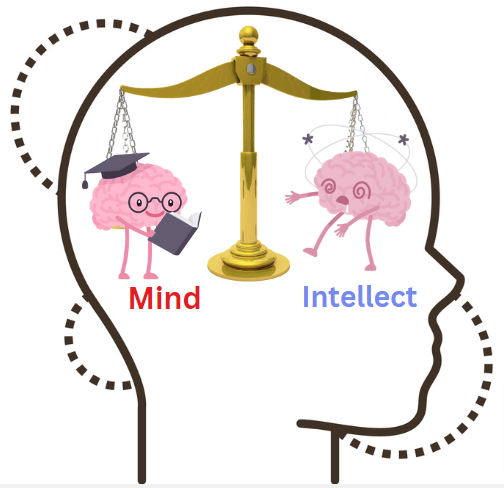
Have you ever experienced an intense internal debate when you’re about to begin a new task, adopt a new habit, execute a planned activity, or contemplate a significant change?
First, let’s get to know the two characters. One is the intellect, and the other is the mind. They possess contrasting qualities and often don’t align unless we train them to synchronize
Intellect: The intellect understands both the past and the future, assessing your growth. It’s constantly focused on your advancement. It generates ideas based on your experiences, observations, and learnings. Think of it as a loyal servant, ever eager to champion your growth and willing to take risks. Its primary opponent is the mind.
Mind: The mind is a potent mechanism that primarily regulates your present, concentrating on the current moment. It’s often driven by the quest for immediate gratification, weighing the benefits it might gain from future actions. For example, if you’re working towards a long-term goal or exercising, your mind might tempt you to stop, suggesting you indulge in a movie, savor an ice cream, engage in intimacy, or any activity that provides immediate pleasure. It leans towards inertia, preferring comfort and avoiding risks, in stark contrast to the intellect.
Imagine this scenario: On a fine evening, before bed, you resolve that starting the next day at 6 am, you’ll either hit the gym or go for a walk for better physical health. This decision, made by your intellect, gives you satisfaction and optimism for the future. At this point, the mind is unaware of this decision. You sleep soundly, but when morning arrives and it’s time to act on your decision, a conflict arises.
Imagine this internal dispute as a courtroom scene. In this metaphorical trial, the intellect and the mind stand as opposing parties. The judge calls upon the intellect first, which lays out the plan for exercise and its benefits. However, as the intellect speaks, the mind reacts with unexpected hostility. It challenges the decision by highlighting past failures, presenting potential risks like injuries from exercise, and tempts with immediate pleasures like watching Netflix. The mind knows all your vulnerabilities and will use them extensively to win its case.
By the end of this intense exchange, the judge turns back to the intellect and inquires if it has any evidence to support its plans since they involve future events. Often, the intellect may not have concrete evidence for events that haven’t yet occurred. Given this, the judge (representing your final decision) sides with the mind, allowing you to skip the exercise and stay in comfort. It’s important to note that each time the mind wins using past setbacks as evidence, the intellect becomes more cautious and less confident about future planning. After such a verdict, while the mind gains strength, the intellect may seek a higher form of validation or reconsider its approach.
What can the intellect do now? It can either accept the outcome or appeal to a higher court. We know that higher courts usually demand more substantial evidence than lower ones. So, after its initial setback, the intellect realizes it needs to come prepared. It meticulously drafts a comprehensive blueprint for achieving physical well-being: outlining the specifics of the plan, the effort duration, anticipated benefits, potential challenges, strategies to tackle these challenges, and evaluating every possible sacrifice involved. The intellect now understands that it must work alongside the mind. Instead of laying out plans for an entire month or a lifetime, it focuses on just a day at a time, ensuring the mind remains comfortable and open to repetition.
The hearing resumes, and the intellect presents its elaborate plan visually. The mind, albeit reluctantly, starts to see the merit and slowly agrees to execute the plan.
Once you arrive at the gym or the park, seeing others committed to their physical well-being helps validate the intellect’s claim. However, the mind, innately self-centric, feels slighted when the intellect prevails. Hence, it might try to divert you from your path. To ensure continued success, the intellect must gather evidence of positive outcomes and the benefits witnessed from the external world. Here’s a little trick: visualization techniques. The mind can’t discern between reality and imagination. By visualizing success, the mind can be convinced, albeit begrudgingly. It will, however, always be on the lookout for slip-ups and any chance to prove the intellect wrong.
In essence, this is the dynamic interplay between the mind and the intellect. Recognizing this relationship can empower us to achieve better results every day

